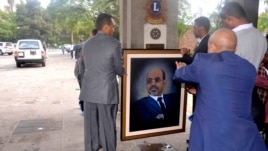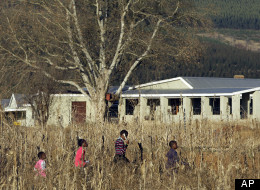
تركت العاملة الفيليبينية في عهدة رابطة كاريتاس (أرشيف ــ مروان طحطح)
منع الطعام عنها
لم تكن جونالين لاس تعلم أن الحظّ السيّئ
سيرمي بها بين براثن ربّة منزلٍ لا تعرف الرحمة، عندما تركت وطنها
الفيليبين لتعمل خادمة في لبنان. هنا، انتقلت إلى منزل مخدومتها. سيّدة
ثلاثينية تقطن في عوكر. بدأت بخدمتها منذ سنتين، لكن رحة عذابها بدأت منذ
أشهر، وانتهت أخيراً في غرفة العناية المركّزة في مستشفى قلب يسوع. الأشهر
القليلة الماضية كانت جحيماً بالنسبة إلى الفتاة التي لم تتجاوز الثامنة
عشرة من عمرها. ذاقت خلالها جونالين مختلف أنواع العذاب. تتحدّث عن تعرّضها
للضرب والتعذيب بواسطة عصا وحزام جلدي حفرا ندوباً وجروحاً في كلّ بقعة من
جسدها النحيل.
بقعٌ قد تمحوها الأيام، لكن سيصعب على ذاكرتها نسيانها. ذاكرة بشرية
ستحفظ اسم ربة المنزل رين، كما اسمها، بعدما كادت تتسبب في قتلها، علماً أن
القضاء أوقفها بجرم محاولة قتلها.
منذ عدة أسابيع، أبلغ الجيران المديرية العامة للأمن العام بوجود خادمة تتعرّض للضرب المبرح لدى المدعوة رين ب.
بناء على هذا البلاغ، جرى التحرّك، ونُقلت لاس إلى العناية الفائقة المركزة في المستشفى حيث كانت تعاني من سوء في التغذية وتعذيب جسدي مبرح. بكلّ وضوح يمكن رؤية الكدمات تحت العينين، والورم الكبير في الأذن. بالإضافة إلى تورّم واحمرار في أصابع اليدين، وندوب عند أعلى القفص الصدري والظهر، يدل شكلها المستطيل يدل على أنها ناجمة عن الضرب بحزام أو عصا. هذا عدا وجود آثار جروح وندوب في الثديين الأيمن والأيسر بشكل هلالي ناجم عن غرز الأظافر. وبحسب المعلومات الواردة في تقرير الطبيب الشرعي، فإن أعمار الجروح الموجودة المتفاوتة على جسد لاس تدلّ على حصول الأذية في مراحل وأوقات مختلفة، وبشكل متكرّر. وأشار التقرير إلى أن الإصابات الموجودة على جسد الضحية ناجمة عن التعرّض للضرب بالأيدي والعصا والحزام، لافتاً إلى أن هزالة بنيتها تدل على أنها تعاني من سوء تغذية شديد. وقد رأى الطبيب الشرعي بشارة مكرزل أن حالتها الصحية تستدعي التعطيل عن العمل لمدة ثلاثة أسابيع.
بدأت التحقيقات. فاستمع عناصر التحقيق إلى إفادة العاملة الفيليبينية التي كشفت أنها بدأت تتعرض لمضايقات منذ قرابة سنة. الصفعة الأولى التي تلقتها، جاءت على خلفية تحادثها عبر الشرفة مع شابة من التابعية الفيليبينية. وذكرت جونالين أن هذه الحادثة كانت الأولى، لكنها كانت فاتحة الصفع المتكرّر والدفع. فقد صارت ربة المنزل تستعمل العصي والحزام وبعض الآلات الحادة على مختلف أنحاء جسدها لضربها، كما أنها لم تكن تتورّع عن سكب بعض الأدوية المستعملة للتنظيف على رأسها. ليس هذا فحسب، بل أفادت بأنها كانت تصعقها أحياناً بآلة كهربائية!
أما عن الدوافع والأسباب، فذكرت جونالين أنها كانت تتعرّض للضرب في حال لم تُنه الأعمال المنزلية في الوقت المحدّد، أو في حال تناولها الطعام من دون إذن. وفي موضوع الطعام تلفت إلى حرمانها بالتدريج. ففي البداية، منعت من تناول وجبات كاملة، قبل أن يحصر طعامها بالخبز فقط، ثم حرمانها أياماً من الوجبات. وذكرت أنه في احدى المرات حُبست عارية في الحمام من دون مياه، كاشفة أنها اضطرت إلى الشرب من مياه الصرف الصحي لري ظمئها. كما أفادت أن شقيق ربة المنزل تحرّش بها ثلاث مرات وهدّدها بأنها لو أخبرت أحداً فإنها ستتعرّض للضرب، لافتة إلى أن ربة المنزل كانت تهدّدها دائماً بأنها ستتهمها بالسرقة إن فكرت بالادعاء عليها.
في موازاة ذلك، أبلغ رتيب التحقيق، ربّة المنزل رين ب. بضرورة الاستماع إلى إفادتها، فأبلغه شقيقها أنها أُدخلت إلى المستشفى بسبب إصابتها بنوبة عصبية. ولدى الاتصال بطبيبها المعالج، أفاد أنها تعاني من صدمة نفسية وعصبية وتحتاج إلى وقت للخروج من ذلك ناصحاً بعدم أخذ إفادتها حالياً. مرّ وقت قليل قبل أن يُستمع إلى إفادتها، فذكرت أنها كانت تعامل خادمتها معاملة جيدة حتى قبل أربعة أشهر عندما بدأت الخادمة تقوم بأمور غريبة بعض الشيء. ولدى الاستيضاح، ذكرت أن شخصاً مجهولاً يقود فاناً صار يقف أمام منزلها عندما تكون الخادمة على الشرفة ويقوم بأعمال مخلّة بالآداب. وذكرت أنها وجهت ملاحظات لها بعدم الاتصال بأشخاص كهؤلاء، إلا أن الأخيرة لم ترتدع. وفاقم الأمر أن الأخيرة صارت تماطل في القيام بواجبها المنزلي.
وعن الإصابات التي تعاني منها الخادمة، ذكرت ربة المنزل أنها ناجمة عن سقوطها على الدرج بعد محاولتها الهرب، كاشفة أنها دفعت والدتها العجوز أرضا أثناء محاولة الأخيرة منعها من الهرب. وأفادت بأنها أحضرت لها دواءً من دون أخذها إلى الطبيب خوفاً من محاولتها الفرار مجدداً، نافية أن تكون تعرضت لها بالصفع أو الضرب. وأكّدت أنها لم تمنع عنها الطعام يوماً، إلا أنها بدأت منذ قرابة عشرة أيام تمتنع عن الطعام بمحض إرادتها. وعن قصّ شعرها، ادّعت أنه نتيجة لإصابتها بالقمل، أما الندوب الموجودة على ظهرها، فذكرت أن جونالين سبق وأخبرتها أنها كانت تتعرض للضرب على يد والدها وأنها سقطت عن درج منزلهم في الفيليبين.
عقب ذلك، أشار القضاء بترك الفيليبينية في عهدة رابطة كاريتاس، طالباً سوق ربة المنزل الموقوفة إلى سجن بعبدا للنساء. وفي موازاة التحقيق القائم، طالبت سفارة الفيليبين وزارة العمل بالتحرك واتخاذ كافة التدابير لمعاقبة من تسبب في المعاملة غير الإنسانية للعاملة المذكورة. وفي المقابل، اتخذت وزارة العمل صفة الادعاء الشخصي على المدعوة رين ب
منذ عدة أسابيع، أبلغ الجيران المديرية العامة للأمن العام بوجود خادمة تتعرّض للضرب المبرح لدى المدعوة رين ب.
بناء على هذا البلاغ، جرى التحرّك، ونُقلت لاس إلى العناية الفائقة المركزة في المستشفى حيث كانت تعاني من سوء في التغذية وتعذيب جسدي مبرح. بكلّ وضوح يمكن رؤية الكدمات تحت العينين، والورم الكبير في الأذن. بالإضافة إلى تورّم واحمرار في أصابع اليدين، وندوب عند أعلى القفص الصدري والظهر، يدل شكلها المستطيل يدل على أنها ناجمة عن الضرب بحزام أو عصا. هذا عدا وجود آثار جروح وندوب في الثديين الأيمن والأيسر بشكل هلالي ناجم عن غرز الأظافر. وبحسب المعلومات الواردة في تقرير الطبيب الشرعي، فإن أعمار الجروح الموجودة المتفاوتة على جسد لاس تدلّ على حصول الأذية في مراحل وأوقات مختلفة، وبشكل متكرّر. وأشار التقرير إلى أن الإصابات الموجودة على جسد الضحية ناجمة عن التعرّض للضرب بالأيدي والعصا والحزام، لافتاً إلى أن هزالة بنيتها تدل على أنها تعاني من سوء تغذية شديد. وقد رأى الطبيب الشرعي بشارة مكرزل أن حالتها الصحية تستدعي التعطيل عن العمل لمدة ثلاثة أسابيع.
بدأت التحقيقات. فاستمع عناصر التحقيق إلى إفادة العاملة الفيليبينية التي كشفت أنها بدأت تتعرض لمضايقات منذ قرابة سنة. الصفعة الأولى التي تلقتها، جاءت على خلفية تحادثها عبر الشرفة مع شابة من التابعية الفيليبينية. وذكرت جونالين أن هذه الحادثة كانت الأولى، لكنها كانت فاتحة الصفع المتكرّر والدفع. فقد صارت ربة المنزل تستعمل العصي والحزام وبعض الآلات الحادة على مختلف أنحاء جسدها لضربها، كما أنها لم تكن تتورّع عن سكب بعض الأدوية المستعملة للتنظيف على رأسها. ليس هذا فحسب، بل أفادت بأنها كانت تصعقها أحياناً بآلة كهربائية!
أما عن الدوافع والأسباب، فذكرت جونالين أنها كانت تتعرّض للضرب في حال لم تُنه الأعمال المنزلية في الوقت المحدّد، أو في حال تناولها الطعام من دون إذن. وفي موضوع الطعام تلفت إلى حرمانها بالتدريج. ففي البداية، منعت من تناول وجبات كاملة، قبل أن يحصر طعامها بالخبز فقط، ثم حرمانها أياماً من الوجبات. وذكرت أنه في احدى المرات حُبست عارية في الحمام من دون مياه، كاشفة أنها اضطرت إلى الشرب من مياه الصرف الصحي لري ظمئها. كما أفادت أن شقيق ربة المنزل تحرّش بها ثلاث مرات وهدّدها بأنها لو أخبرت أحداً فإنها ستتعرّض للضرب، لافتة إلى أن ربة المنزل كانت تهدّدها دائماً بأنها ستتهمها بالسرقة إن فكرت بالادعاء عليها.
في موازاة ذلك، أبلغ رتيب التحقيق، ربّة المنزل رين ب. بضرورة الاستماع إلى إفادتها، فأبلغه شقيقها أنها أُدخلت إلى المستشفى بسبب إصابتها بنوبة عصبية. ولدى الاتصال بطبيبها المعالج، أفاد أنها تعاني من صدمة نفسية وعصبية وتحتاج إلى وقت للخروج من ذلك ناصحاً بعدم أخذ إفادتها حالياً. مرّ وقت قليل قبل أن يُستمع إلى إفادتها، فذكرت أنها كانت تعامل خادمتها معاملة جيدة حتى قبل أربعة أشهر عندما بدأت الخادمة تقوم بأمور غريبة بعض الشيء. ولدى الاستيضاح، ذكرت أن شخصاً مجهولاً يقود فاناً صار يقف أمام منزلها عندما تكون الخادمة على الشرفة ويقوم بأعمال مخلّة بالآداب. وذكرت أنها وجهت ملاحظات لها بعدم الاتصال بأشخاص كهؤلاء، إلا أن الأخيرة لم ترتدع. وفاقم الأمر أن الأخيرة صارت تماطل في القيام بواجبها المنزلي.
وعن الإصابات التي تعاني منها الخادمة، ذكرت ربة المنزل أنها ناجمة عن سقوطها على الدرج بعد محاولتها الهرب، كاشفة أنها دفعت والدتها العجوز أرضا أثناء محاولة الأخيرة منعها من الهرب. وأفادت بأنها أحضرت لها دواءً من دون أخذها إلى الطبيب خوفاً من محاولتها الفرار مجدداً، نافية أن تكون تعرضت لها بالصفع أو الضرب. وأكّدت أنها لم تمنع عنها الطعام يوماً، إلا أنها بدأت منذ قرابة عشرة أيام تمتنع عن الطعام بمحض إرادتها. وعن قصّ شعرها، ادّعت أنه نتيجة لإصابتها بالقمل، أما الندوب الموجودة على ظهرها، فذكرت أن جونالين سبق وأخبرتها أنها كانت تتعرض للضرب على يد والدها وأنها سقطت عن درج منزلهم في الفيليبين.
عقب ذلك، أشار القضاء بترك الفيليبينية في عهدة رابطة كاريتاس، طالباً سوق ربة المنزل الموقوفة إلى سجن بعبدا للنساء. وفي موازاة التحقيق القائم، طالبت سفارة الفيليبين وزارة العمل بالتحرك واتخاذ كافة التدابير لمعاقبة من تسبب في المعاملة غير الإنسانية للعاملة المذكورة. وفي المقابل، اتخذت وزارة العمل صفة الادعاء الشخصي على المدعوة رين ب














